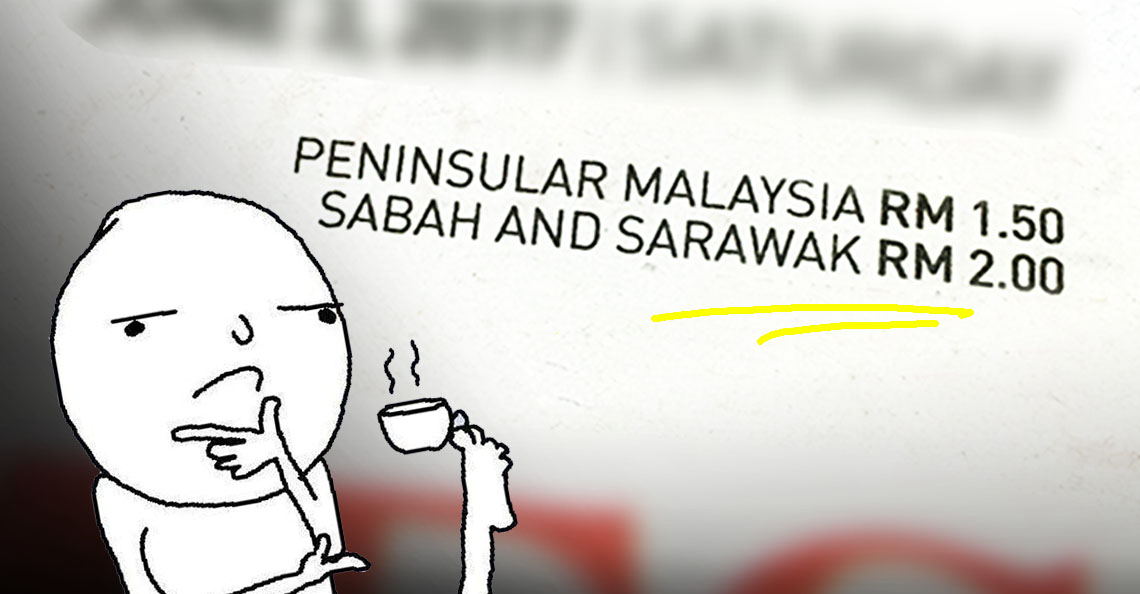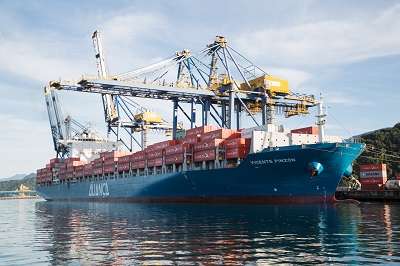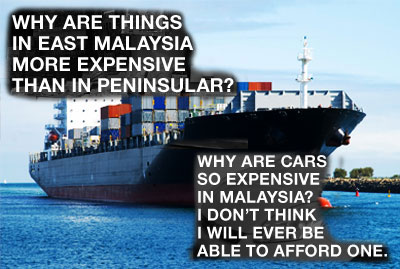Did Najib make everyting in Sabah and Sarawak cheaper by abolishing this one thing?

- 1.9KShares
- Facebook1.9K
- Twitter2
- LinkedIn12
- Email19
- WhatsApp51
A few weeks ago, before our Prime Minister was uninvited to join the league of supervillains, he was lauded as a superhero while he was visiting Sabah to launch a patriotism programme in Sandakan. On May 7 while launching the programme in Sandakan, Najib had a special announcement to make:
Starting on 1 June, Sabah, Sarawak and Labuan will be exempted from the cabotage policy for transshipment of goods from West Malaysia to East Malaysia.
Woaahhh~!~!!!! This is BIG NEWS weh for East Malaysians. After this was announced, you can see how happy the Chief Ministers of Sabah and Sarawak were about this.
But why is this big news (is it even good news?). Why only for East Malaysia? What is Najib even talking about?! So first things first, we need to understand what is cabotage…
So what is cabotage?!

Hold up. Cabotage has nothing to do with cabbages…. In fact, cabotage is a fancy (French) word meaning the transport of goods between two places in the same country, and whether a ship from a country can transport goods to another country depends if it has cabotage rights. For countries such as US, Japan, and most recently Indonesia, cabotage rights is only given to ships that belong to their own country.
In Malaysia, our cabotage rights is protected in the Merchant Shipping Ordinance 1952 and a cabotage policy was amended into the ordinance in January 1980. Under the cabotage policy, ships from foreign countries are prohibited to transport between ports in Malaysia, which can only be done by licensed Malaysian ships. This meant that all imports shipping from outside Malaysia must first travel to Port Klang, before it is loaded onto a licensed Malaysian vessel and sent to its destination.

The rationale at the time for the cabotage policy was to protect the Malaysian shipping industry, and to make Port Klang the transshipment hub of Malaysia, since all incoming traffic must converge to Port Klang first.
How does cabotage affect Sabah and Sarawak?

The cabotage policy is often overlooked by West Malaysians because once their cargo reaches Port Klang, it can be transported to any state in the peninsular by road or rail. But it’s a different story for Sabah and Sarawak. In order for imported goods to reach Sabah or Sarawak, it can only be done by air or sea. In other words, after the goods has reached Port Klang, it has to be shipped again from Port Klang to East Malaysia.
With more middle-men involved in the process, this not only means that it takes longer for things to reach in East Malaysian, but also a price increase of up to 30% for stuff that we would normally get in West Malaysia.

The cabotage not only affects imports, but works on exports as well. When goods are exported from Sabah or Sarawak, it needs to be sent to Port Klang first before it goes out to the international market. Manufacturers in Sabah have claimed that this has increased the cost of exporting their goods outside to the point of being not feasible, and eventually even leading up to closing shop altogether. This is partly the reason why as of 2016, the manufacturing industry in Sabah only contributes 8.6% of the sate’s gross domestic product.
Over the last 30 years, the cabotage policy has blamed by politicians, economists, the business community, and the consumers from Sabah and Sarawak for their higher cost of living, with calls for it to be liberated, if not abolished altogether. It has gotten to the point that some Sabahans and Sarawakians have view the cabotage policy as a form of discrimination against the Borneon states by West Malaysian, who do not have to suffer the brunt of the cabotage policy.
So now no more cabotage, things will be cheaper lah?

While the reaction from various sectors in Sabah and Sarawak have appeared to be positive towards Najib’s announcement that there will be no more cabotage (for now), it is time to see how much does the cabotage add up in the equation of causing goods in Sabah and Sarawak to be more expensive.
While reviewing the cabotage policy, the federal Ministry of Transport has gone on record saying that it doesn’t believe that the cabotage policy played a major role in causing the prices of goods in East Malaysia to shoot up. Citing a study from the World Bank, Datuk Seri Liow Tiong Lai stated that it was other factors that caused the price hike.
“According to the study, the high costs are a result of weak distribution channels, high handling charges and inefficient inland transportation,” – Minister of Transport Datuk Seri Liow Tiong Lai, quoted in The Star
Even Sabah’s own Minister of Industrial Development is not even sure if the exemption of cabotage will surely mean that prices will fall, and will be monitoring on the effect of the exemption.
Economist have also looked at the cabotage policy as only one small piece in the puzzle, and reminded that there are more factors at play that is affecting the prices in Sabah and Sarawak other than cabotage. Among the major ones are the declining value of the Ringgit, and that the market size of both states does not attract a sizeable volume of cargo to be impacted by the exemption of the cabotage policy.

The Federation of Sabah Industries (FSI), which is represented by different sectors in Sabah from housing, timber, manufacturing, chambers of commerce, transport to the auto sector, thinks that removing the cabotage policy is not like removing a tax policy that would have an immediate effect.
“The Cabotage policy is not solely about price reduction but also about fair prices and fair competition and their effects on the growth of the manufacturing and other sectors in the country.
“We believe the so-called reduction in price will not be happening overnight as claimed by many quarters,” – Federation of Sabah Industries (FSI) Honorary Life President Datuk Seri Wong Khen Thau, quoted in The Daily Express
Instead, what they have proposed is that further steps need to be taken in order to enjoy the benefits of the cabotage exemption that is to ensure fairer competition, improving infrastructure and promoting East Malaysian ports (like the Sepanggar Bay Container Terminal).
And not everyone agrees that removing cabotage is a good thing…

By removing the cabotage policy, this means that any ship can dock at any port in Malaysia. This directly affects the local shipping companies that will now face competition from these foreign shipping companies.
In Sarawak, lawmakers foresee that the new competition could potentially cause half of the jobs in the state’s shipping industry to be lost.
Shipping associations in Malaysia have also voiced their concern on what the removal of the cabotage policy will mean to their business. The Sarawak and Sabah Ship Owners Association (SSSA) have claimed that without the cabotage policy, the shipping industry of East Malaysia is doomed, and according to Malaysian Shipping Association, these local shipping companies might be forced to relocate their business outside of Malaysia in order to survive.
“Although we will need to submit our application to run a tax-free domestic trade in Malaysia periodically, in Singapore we don’t need to do that and we are free to use any nationalities as our crew, But the question is, how many of us can bring our businesses to Singapore and why should we? – Malaysian Shipping Association chairman Ooi Lean Hin, quoted in The Malay Mail Online.
To them, this is a price too much to pay for removing something that is not likely to affect the livelihood of the people of Sabah and Sarawak, but could kill what’s left of Sabah and Sarawak’s shipping industry.
“It is not the Cabotage Policy which impedes trade but the imbalanced economic development between East and West Malaysia.
“This has to be addressed systematically and strategically,” – Sarawak and Sabah Shipowners Association (SSSA) and Sarawak Shipping Association (SSA) statement, quoted in The Borneo Post.
But is the cabotage policy gone for good?

One thing that many may find surprising is that the cabotage policy had in fact been partially liberalised before in 2009, which allowed foreign ships to carry transhipment cargo from Port Klang to the ports in East Malaysia, and there was no significant changes in the prices since then.
When Najib made the announcement, it was vague as to whether the cabotage policy would be gone for good. While in the eyes of Sarawak’s Chief Minister is that the cabotage is abolished, but the policy cannot be abolished so easily.
According to a Sabah rights activist, the removal of the cabotage policy has to be done by repealing it from the Merchant Shipping Ordinance 1952, which the Minister of Transport said would NOT be repealed.
Sabah-based parties have also noted that the purpose of giving an exemption to cabotage is more to gain political mileage, rather than for the benefit of the rakyat.
But in the end, we don’t even know for how long the exemption would be effective as there are reports that the exemption is just a test to see if it will help reduce prices in Sabah or Sarawak, and could be reinstated again after six months.
So whether the cabotage policy really does make things more expensive in Sabah and Sarawak is really up to the players in the state to decide, and they have already one less reason to blame the federal government.
- 1.9KShares
- Facebook1.9K
- Twitter2
- LinkedIn12
- Email19
- WhatsApp51



